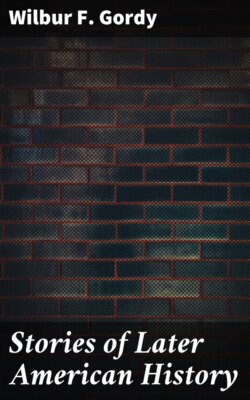Читать книгу Stories of Later American History - Wilbur F. Gordy - Страница 9
На сайте Литреса книга снята с продажи.
PATRICK HENRY’S FIERY SPEECH AGAINST THE STAMP ACT
ОглавлениеTable of Contents
History gives us a vivid picture of the young lawyer at this time as he rides on horseback along the country road toward Williamsburg, then the capital of Virginia. He is wearing a faded coat, leather knee-breeches, and yarn stockings, and carries his law papers in his saddle-bag. Although but twenty-nine, his tall, thin figure stoops as if bent with age. He does not look the important man he is soon to become.
When he reaches the little town of Williamsburg, he finds great excitement. Men gather in small groups on the street, talking in anxious tones. Serious questions are being discussed: “What shall we do about the Stamp Act?” they say. “Shall we submit and say nothing? Shall we send a petition to King George asking him for justice? Shall we beg Parliament to repeal the act, or shall we take a bold stand and declare that we will not obey it?”
Not only on the street, but also in the House of Burgesses was great excitement. Most of the members were wealthy planters who lived on great estates. So much weight and dignity had they that the affairs of the colony were largely under their control. Most of them were loyal to the “mother country,” as they liked to call England, and they wished to obey the English laws as long as these were just.
Patrick Henry Delivering His Speech in the Virginia House of Burgesses.
So they counselled: “Let us move slowly. Let nothing be done in a passion. Let us petition the King to modify the laws which appear to us unjust, and then, if he will not listen, it will be time to refuse to obey. We must not be rash.”
Patrick Henry, the new member, listened earnestly. But he could not see things as these older men of affairs saw them. To him delay seemed dangerous. He was eager for prompt, decisive action. Tearing a blank leaf from a law-book, he hastily wrote some resolutions, and, rising to his feet, he read them to the assembly.
We can easily picture the scene. This plainly dressed rustic with his bent shoulders is in striking contrast to the prosperous plantation owners, with their powdered hair, ruffled shirts, knee-breeches, and silver shoe-buckles. They give but a listless attention as Henry begins in quiet tones to read his resolutions. “Who cares what this country fellow thinks?” is their attitude. “Who is he anyway? We never heard his voice before.”
It is but natural that these men, whose judgment has been looked up to for years, should regard as an upstart this young, unknown member, who presumes to think his opinion worth listening to in a time of great crisis like this.
But while they sit in scornful wrath, the young orator’s eyes begin to glow, his stooping figure becomes erect, and his voice rings out with fiery eloquence. “The General Assembly of Virginia, and only the General Assembly of Virginia,” he exclaims, “has the right and the power of laying taxes upon the people of this colony.”
These are stirring words, and they fall amid a hushed silence. Then the debate grows hot, as members rise to speak in opposition to his burning eloquence.
William Pitt.
But our hero is more than a match for all the distinguished men who disagree with him. Like a torrent, his arguments pour forth and sweep all before them. The bold resolutions he presents are passed by the assembly.
It was a great triumph for the young orator. On that day Patrick Henry made his name. “Stick to us, old fellow, or we’re gone,” said one of the plain people, giving him a slap on the shoulder as he passed out at the close of the stormy session. The unpromising youth had suddenly become a leader in the affairs of the colony.
Not only in Virginia, but also in other colonies, his fiery words acted like magic in stirring up the people against the Stamp Act. He had proved himself a bold leader, willing to risk any danger for the cause of justice and freedom.
You would expect that in the colonies there would be strong and deep feeling against the Stamp Act. But perhaps you will be surprised to learn that even in England many leading men opposed it. They thought that George III was making a great mistake in trying to tax the colonies without their consent. William Pitt, a leader in the House of Commons, made a great speech, in which he said: “I rejoice that America has resisted.” He went on to say that if the Americans had meekly submitted, they would have acted like slaves.
Burke and Fox, other great statesmen, also befriended us. And the English merchants and ship owners, who were losing heavily because the Americans refused to buy any English goods as long as the Stamp Act was in force, joined in begging Parliament that the act be repealed. This was done the next year.
Other unjust measures followed, but before we take them up, let us catch another glimpse of Patrick Henry, ten years after his great speech at Williamsburg.
